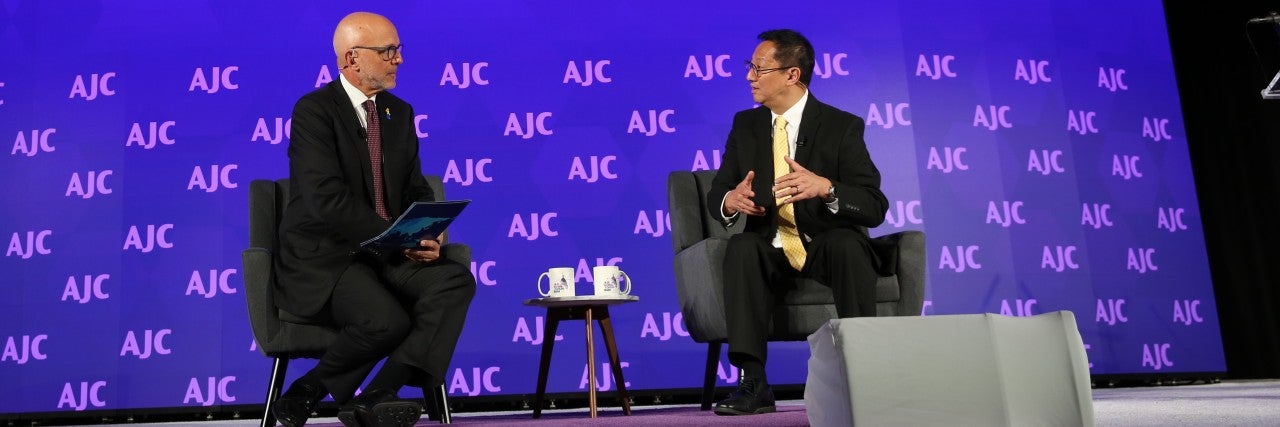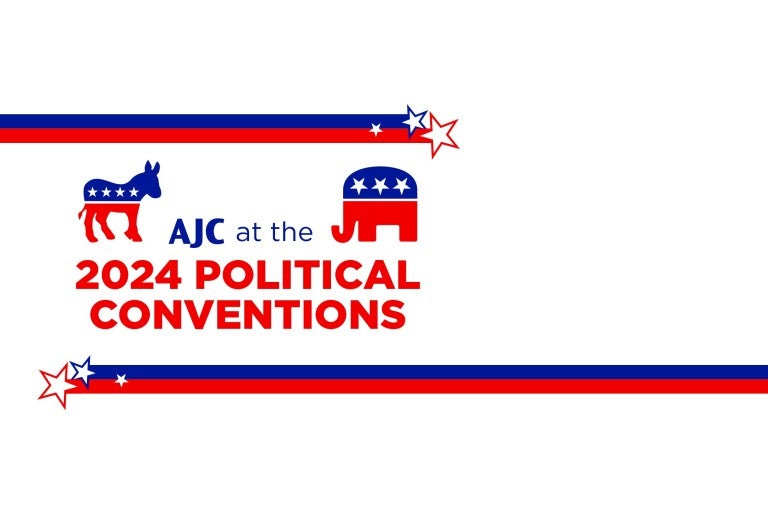June 13, 2024
Over this past school year, college campuses nationwide experienced a sharp rise in antisemitism. In the wake of the October 7 attacks on Israel by Hamas terrorists, Jewish students found themselves living and studying in environments rife with anti-Israel protests, anti-Jewish vitriol, and increasingly hostile atmospheres. University administrators took center stage as the Jewish community looked for signs of moral vision on combating rising campus antisemitism.
At AJC Global Forum 2024, two university presidents—Ron Liebowitz, president of Brandeis University, and Santa Ono, president of the University of Michigan—shared best practices, hard lessons learned, and ways they plan to create a campus atmosphere where everyone—including Jewish students—are free to learn, study, and engage in the open exchange of ideas.
Here are five takeaways from their respective discussions with Dr. Laura Shaw Frank, AJC Director William Petschek Contemporary Jewish Life and AJC CEO Ted Deutch.
1) University administrations must define free speech and academic freedom.
In 2018, Brandeis adopted six principles of free speech that helped guide the university when anti-Israel protesters began to demonstrate on campus.
“I believe very strongly in free speech. It's really the only way to engage in differences and learn from one another,” Liebowitz said. “However, there is a point by which I think one starts infringing upon the academic mission of the institution. …. It doesn't advance the educational mission to have people screaming death to others. That does not advance any education.”
Liebowitz also reminded faculty that academic freedom gives them the right to lecture or assign reading related to their expertise. It does not give them the freedom to pontificate on any and all issues in the classroom or cancel or postpone classes for students to protest.
2) When pushed to embrace BDS, double down on engagement with Israel.
When a professor asked Liebowitz earlier this year whether he considered him antisemitic for supporting BDS, the president simply asked him if he supported boycotts of any other country. He answered with silence, proving the president’s point.
President Ono agreed. “Boycotting one nation, in this case Israel, to the exclusion of any other nation, is nothing other than antisemitism,” Ono told the audience. He announced that after October 7, Michigan took steps to deepen its decade-plus long relationship with Israeli institutions including Technion, Israel Institute of Technology in Haifa and the Weizmann Institute of Science in Rehovot.
“Incredible discoveries that benefit all of mankind have come out of that relationship between Michigan and these universities,” Ono said. “It's simply ludicrous for an institution like Michigan that has global links … to cut bridges. Universities are meant to build bridges for the benefit of humanity, so we will … enhance those kinds of collaborations for the benefit of students around the world.”
3) Devote entire centers to study antisemitism.
Over the last 15 months, Brandeis has launched three programs to teach future Jewish professionals, higher education leaders, and students training to work in various sectors about fighting antisemitism.
The Cohen Center for Modern Jewish Studies at Brandeis has also shifted its focus to address campus antisemitism, with the aim of studying the attitudes of Jewish and non-Jewish campus populations to better address the current crisis.
“Brandeis has this role to play,” Liebowitz said. “It's a sort of a new role in addition to the academics, but I think it's really our calling and it's our responsibility.”
The University of Michigan also inaugurated a major research initiative recently: the Raoul Wallenberg Institute, named for the renowned 1935 Michigan graduate who provided passports and safe harbor to thousands of Jews during the Holocaust. The center will examine the root causes of antisemitism and promote civil discourse.
“We wanted to create this Institute, where we would teach people about his values,” Ono said, “where we would bring people together to understand the… dangers of antisemitism or any kind of hate against a religious group.”
4) Intimate conversations make a difference.
Brandeis tried various ways to foster conversation on campus, including the Native American model of learning circles, which allows participants to present their perspectives without any response as a scribe records the information.
The university also canceled classes to have a full day of teach-ins with specialists on the conflict. But neither approach seemed to work. Faculty turned out in large numbers, but students did not want to jeopardize their friendships.
At Michigan, Ono said he learned the importance of being more present for students and reflected that he would have done well to meet with them early on, prior to October 7. He expressed regret for canceling plans to attend a Shabbat dinner hosted by students at Michigan Hillel during the school year.
“This time around, no matter what happens, I'm going to go there because being present is important,” he said.
5) Create a safe space for Jewish students.
Founded nearly 80 years ago, at a time when many American higher education institutions maintained quotas that capped Jewish enrollment, Brandeis countered antisemitism by offering a top-flight university space that was fully open to American Jewish students. Likewise, Michigan also fully opened its doors to Jewish students in the mid-20th century.
In that same spirit, both schools have plans to make sure Jewish students feel welcome on their campuses and thrive. Brandeis extended its deadline this past spring for students wanting to transfer from other schools. Michigan, which boasts one of the largest Jewish populations of a public university, will commit its entire campus during the 2024-2025 school year to upholding democracy and civic engagement, an approach that Ono posited will prove foundational to combating antisemitism and creating an atmosphere where all students can thrive.
Ono added that the university has leaned heavily on AJC to boost its antisemitism education and training for faculty, staff, students, and alumni.
“I want you to know that we will stand with you,” Ono said to students at AJC Global Forum 2024. “We hear you and we're going to do everything we can to make this year a better year than last year.”

